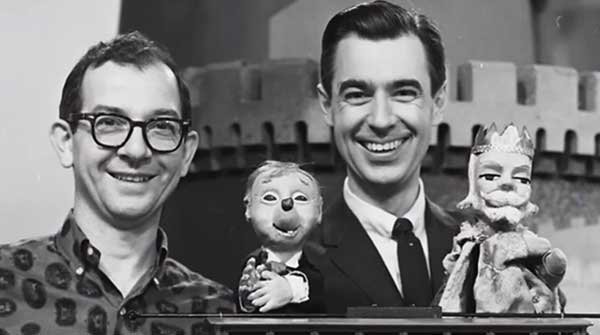Mr. Dressup followed Mister Rogers to Canada, but stayed after Mister Rogers left
Keep your crayons sharp, your sticky tape untangled and always put the tops back on your markers.
 Ernie Coombs, the beloved children’s entertainer known as Mr. Dressup, gave this important piece of advice to Canadians of all ages. I remember him saying this as vividly now as I did when I first heard it.
Ernie Coombs, the beloved children’s entertainer known as Mr. Dressup, gave this important piece of advice to Canadians of all ages. I remember him saying this as vividly now as I did when I first heard it.
Mr. Dressup was an important part of my childhood. He opened up a world of fun, music, laughter, learning and imagination. His never-ending series of costumes plucked from the Tickle Trunk magically transformed him into something different – and transported him to somewhere new. He drew wonderful cartoons, made crafts, sang songs and introduced talented guests. His wholesome conversations with Casey and Finnegan in their treehouse made the hand puppets almost seem real on our TV screens.
Every day was a new adventure with Mr. Dressup. He provided a sense of discovery, a source of wonder and an ability to bring young, curious children with him on a flight of whimsy they would not soon forget.
 |
| Related Stories |
| Canada needs more animated series like Britain’s Mr Benn
|
| An unusual cornucopia of books involving comics and hand puppets
|
| Riding the Toonerville Trolley in Kentucky…or New York?
|
When I recently watched Mr. Dressup: The Magic of Make-Believe on Amazon Prime, those heart-warming thoughts entered my subconscious once more. Directed by Rob McCallum, a talented documentary filmmaker based in London, Ont., it’s a fascinating examination of Coombs’s life and work from different angles and perspectives.
Viewers will go inside the world of Mr. Dressup, which ran on CBC from 1967 to 1996. They’ll discover that Coombs, who was born in Lewiston, Maine and became a Canadian citizen in 1994, was remarkably similar to his fictional Mr. Dressup persona. They’ll meet several people behind the show’s success. They’ll learn about the important contributions of puppeteer Judith Lawrence, who created Casey, Finnegan, Aunt Bird and Alligator Al. They’ll watch puppeteers like Jani Lauzon, Nina Keogh and Karen Valleau being brought in after Lawrence’s retirement to introduce new characters like Granny, Truffles and Chester the Crow, respectively.
There are insights about Coombs’s wife, Lynn, the love of his life (who died tragically in 1992 after being hit by a car), as well as their children and grandchildren. Enjoyable interviews with Canadian celebrities like Yannick Bisson, Michael J. Fox, Graham Greene, Peter Mansbridge and Bif Naked are included, too.
McCallum’s engaging documentary is well worth the price of admission. He brilliantly captures the essence of Coombs as a down-to-earth performer and family man and shows why he was an inspiration to so many. In spite of a few topics that didn’t quite fit the bill (i.e. light references to Lawrence’s left-wing politics, an odd discussion about Casey possibly being a non-binary character), it’s a masterful examination of one of Canada’s greatest children’s entertainers.
One aspect of Mr. Dressup: The Magic of Make-Believe deserves to be isolated. There are several minutes of rarely-seen footage of the remarkable connection between Coombs and another great children’s entertainer, Fred “Mister” Rogers. It’s a piece of television history I was aware of, but many viewers likely weren’t.
Coombs was an assistant puppeteer to Rogers on The Children’s Corner, which ran on WQED in Pittsburgh. Many of the latter’s famous puppets, including Daniel the Striped Tiger, X the Owl, King Friday XIII and Lady Elaine, debuted on this nationally broadcasted show.
CBC’s children’s programming head, Fred Rainsberry, hired Rogers to host a 15-minute program, Misterogers, in 1963. It would be his first time in this lead role. Rogers asked Coombs to come with him to Toronto, and he did. The two men worked together on this program and Butternut Square from 1963 to 1967. (Of interest, the original Neighbourhood Trolley and Kingdom of Make-Believe were developed at CBC studios.)
As successful as Rogers became in Canada, the pull to return home to Pittsburgh was too great. “I remember some of the people saying, ‘What are we going to do when Mister Rogers leaves?’” Rogers said in archival footage included in McCallum’s documentary. “And I said, why don’t you build a program around Ernie, Ernie Coombs? Ernie has never forgotten the child within him. And that informs everything that he does with children.”
Coombs had nothing but similar admiration for Rogers, his mentor and friend.
“Very wonderful and dedicated man. He taught me an awful lot about television for children, about puppeteering,” Coombs said during an event in 2000. “When he left Pittsburgh temporarily to come up to do the Mister Rogers’ Neighbourhood program for CBC, he brought me along as his assistant puppeteer. I think he really didn’t need an assistant puppeteer, but at the time I was unemployed. I just had a brand new baby, so that’s the kind of a guy that Fred Rogers is.”
How fortuitous it was when Mister Rogers met Mr. Dressup. They both had magnificent careers as children’s entertainers. They provided decades of fun, enjoyment and learning for young American and Canadian viewers. They remain a part of many childhood memories – and, in one notable case, greatly extended the lifespan of some art supplies!
Michael Taube, a Troy Media syndicated columnist and Washington Times contributor, was a speechwriter for former Prime Minister Stephen Harper. He holds a master’s degree in comparative politics from the London School of Economics.
For interview requests, click here.
The opinions expressed by our columnists and contributors are theirs alone and do not inherently or expressly reflect the views of our publication.
© Troy Media
Troy Media is an editorial content provider to media outlets and its own hosted community news outlets across Canada.
